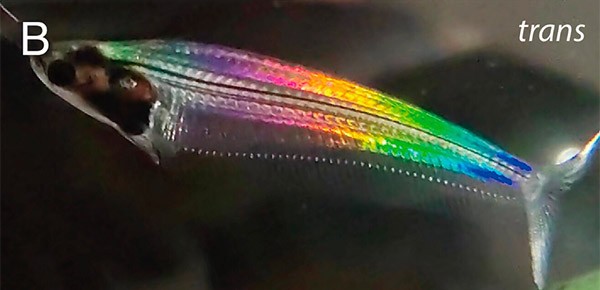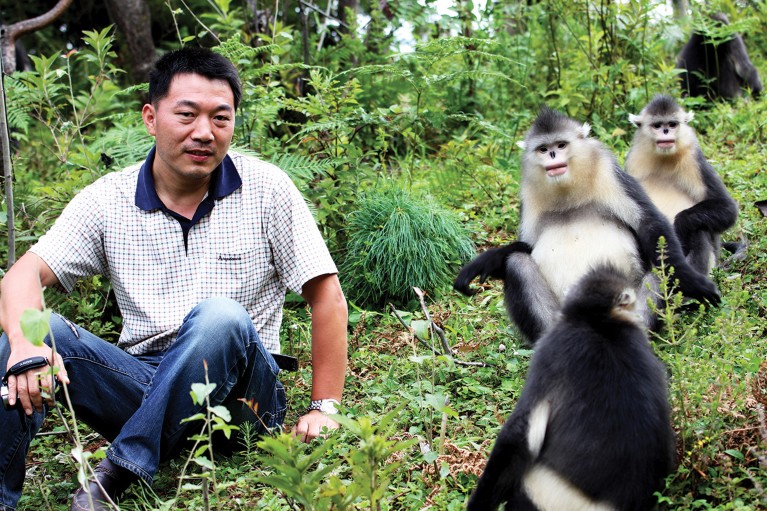Hello Nature readers, would you like to get this Briefing in your inbox free every day? Sign up here

For now, it remains unclear whether the catfish’s rainbow colours serve a purpose. (Xiujun Fan et.al/Proc. Natl. Acad. Sci. U.S.A (CC-BY-NC ND-4.0))
The flickering iridescence of the almost entirely see-through ghost catfish (Kryptopterus vitreolus) comes from microscopic structures in its muscles that bend the light, rather than pigments. Other animals display these shimmering structural colours outside their bodies — a peacock’s feathers or a butterfly’s wings — but the ghost catfish is scaleless. Muscle structures could produce iridescence in other transparent species, such as noodlefishes (Salangidae).
Associated Press | 2 min read
Reference: PNAS paper
Science has been elevated in the Chinese national agenda following policy meetings of the Chinese Communist Party, which concluded yesterday. A new permanent body, which will probably be led by high-level officials, will oversee the existing Ministry of Science and Technology. The move towards more centralized control is driven by geopolitical tensions with the United States, says Marina Zhang, who studies innovation with a focus on China.
Nature | 4 min read
The first cases of a new disease caused solely by eating plastics has been discovered in wild seabirds. Researchers examined the stomachs of young flesh-footed shearwaters (Ardenna carneipes) in Australia and found that the more plastics the birds ingested, the more scarring they had in their digestive tracts. The disease, which the researchers named plasticosis, could make the birds more vulnerable to infection and hinder their digestion. “While these birds can look healthy on the outside, they’re not doing well on the inside,” says study co-author and ecologist Alex Bond.
The Guardian | 3 min read
Reference: Journal of Hazardous Materials paper
Working four days instead of five, with the same pay, improves employees’ well-being without damaging revenue. In the largest-ever trial of a shortened work week — which ran over 6 months in 61 UK companies — 70% of workers reported lower levels of burnout, and almost 40% said they were less stressed. Companies experienced 65% fewer sick days, resignations more than halved and revenues increased by 1.4% on average, compared with an earlier six-month period. More than 90% of the companies in the pilot, which included industries as diverse as financial-services firms and fish-and-chips shops, said they would continue testing reduced working hours.
Scientific American | 6 min read
Reference: Autonomy report
Features & opinion
Table of Contents
Cell-free processes can make an infinite array of proteins and other biomolecules whenever and wherever they are needed. Instead of relying on living yeast and bacteria, which are more interested in growing than in doing useful industrial work, the approach strips away all the components that make a cell ‘alive’. The remains can be freeze-dried and, once rehydrated, start producing things such as vaccine protein conjugates within an hour — like a ‘just add water’ cake mix. The technology still struggles with protein modifications and complex structures such as antibodies, whose cell-free synthesis would be a “game changer”, says bioengineer Matthew DeLisa.
Nature | 7 min read
People who work with research animals can pay a profound emotional price. “It’s one of the only caring professions where you have to harm the beings you’re caring for,” says Megan LaFollette, who works for a group that focuses on improving and reducing animal research. Yet science tends to shy away from openly discussing the challenges, for fear of fanning the controversy that surrounds the field. Some scientists are taking tentative steps towards a support system for colleagues who are experiencing ‘compassion fatigue’.
Science | 16 min read
It’s time to axe the practice of naming species after individuals, say 11 ecologists and biologists. They admit that “any call for exceptional changes in how we name nature requires an exceptional rationale”. But they argue that ‘eponyms’ burden the foundation of taxonomy with political baggage — especially the residue of colonialism. For example, more than 60% of the eponyms given to the flora of New Caledonia are named for French citizens (and 94% of them honour men).
Nature Ecology and Evolution | 10 min read
Where I work

Zuofu Xiang is a zoologist at the Central South University of Forestry and Technology in Changsha, China.Credit: Zuofu Xiang
“It took about two years for the monkeys to become comfortable with our presence and come that close to us,” says zoologist Zuofu Xiang, who has been studying the behaviour of four species of snub-nosed monkey (Rhinopithecus spp.) in China since 2002. His research helps the Chinese government to protect these endangered animals. The way the monkeys work together has also taught Xiang the value of cooperation. “I encourage my students to do likewise, supporting one another and forming collaborations.” (Nature | 3 min read) (Zuofu Xiang)
Today I’m enjoying the idea that the waste heat from computers is being used to heat public swimming pools in the United Kingdom. Deep Green, a start-up company, sticks its data centres into leisure centres (and pays for the electricity to run them). The heat they offload into the water helps local governments with spiralling energy costs and reduces the carbon that would have been emitted by gas-powered heating.
While I ponder how to hook my laptop up to my bathtub (just kidding, don’t do that), why not send me your feedback on this newsletter? Your comments are always welcome at briefing@nature.com.
Thanks for reading,
Flora Graham, senior editor, Nature Briefing
With contributions by Katrina Krämer, Smriti Mallapaty and Sara Phillips
We’ve recently launched two new e-mails you might like. They’re free, and of course you can unsubscribe at any time.
• Nature Briefing: Cancer — a new weekly newsletter written with cancer researchers in mind. Sign up here to receive the next one.
• Nature Briefing: Translational Research covers biotechnology, drug discovery and pharma. Sign up here to get it free in your inbox each week.
